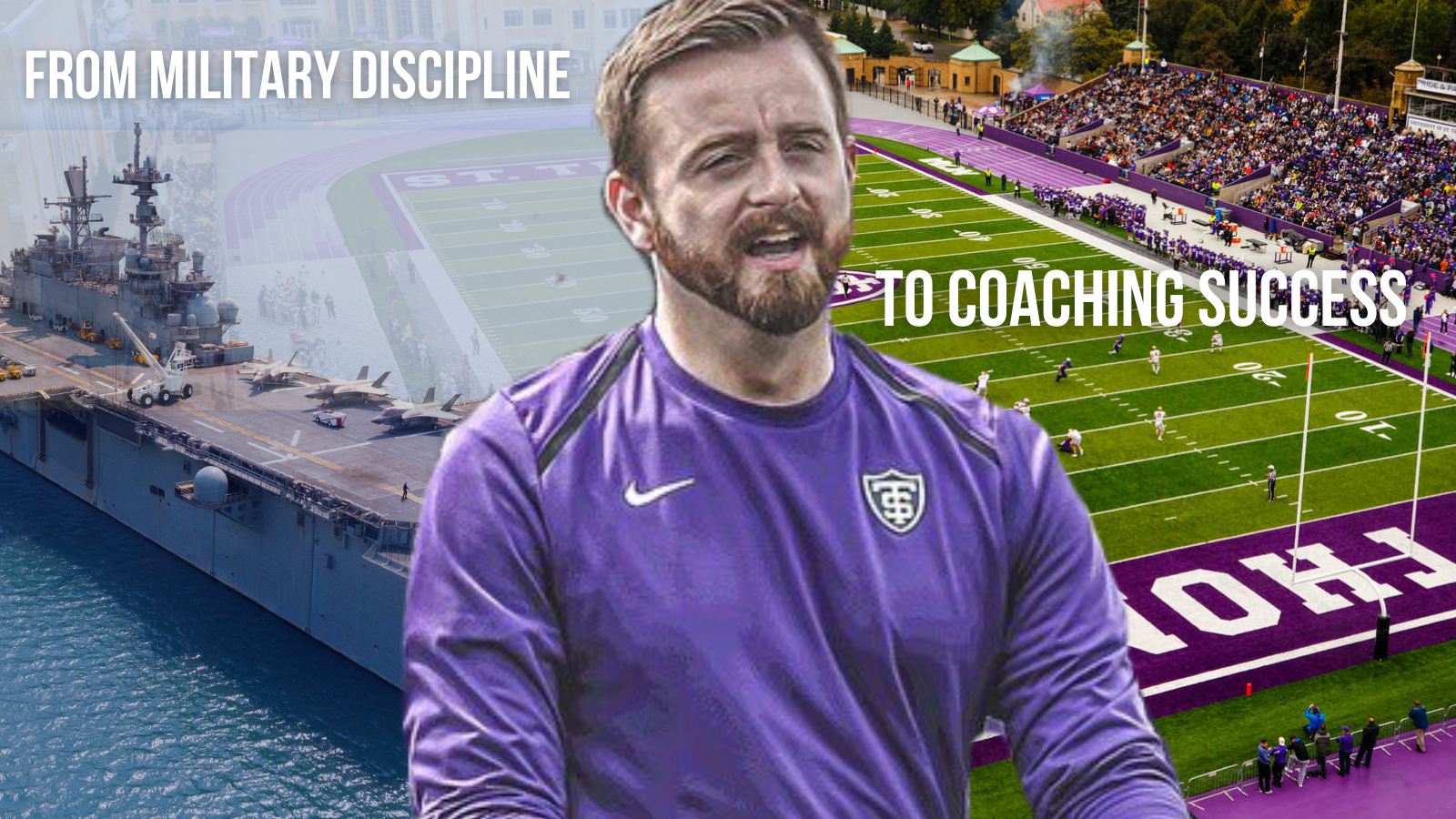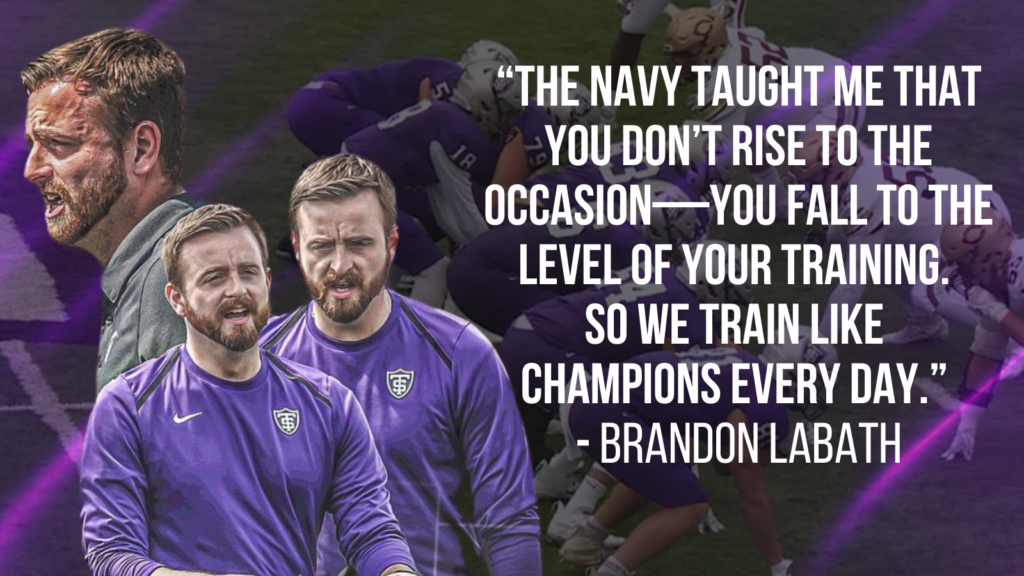
Brandon Labath’s coaching philosophy didn’t form in a film room or on a practice field. It started in the United States Navy, where discipline, structure, and adaptability shaped his approach to leadership. Before coaching Division 1 football at the University of St. Thomas, Labath served four years in the military, an experience that still influences how he develops players, builds game plans, and prepares for the unexpected.
Labath doesn’t see football and military service as separate worlds. He believes the lessons he learned in uniform translate directly to the field. “Discipline, accountability, and structure are the foundation of both,” Labath says. “In the Navy, you had to be locked in every second. In football, the best teams operate the same way.”
The Military Mindset in Coaching
Labath approaches coaching with the precision and focus he learned in the military. Every drill, every meeting, and every rep must have a purpose. His attention to detail allows him to refine the smallest aspects of his players’ technique, ensuring they master fundamentals before moving forward.
“I tell my guys all the time—details win games,” he says. “If you don’t get the little things right in your stance, your footwork, or your communication, you’re not going to execute at a high level. And when the pressure’s on, those small mistakes turn into big ones.”
His military background also instilled a relentless work ethic. While some coaches rely solely on instinct, Labath builds his game plans through exhaustive study and preparation. Whether breaking down blitz patterns or refining blocking angles, he leaves nothing to chance. “The Navy teaches you to be prepared for every possible scenario,” he says. “You don’t wait for things to happen. You anticipate them and have a plan.”
Demanding the Best While Building Relationships
Labath’s coaching style blends intensity with investment. He demands maximum effort from his players but ensures they know he’s in their corner. His military experience taught him that leaders earn respect not just by pushing their teams hard, but by showing they genuinely care.
“Players won’t go to war for a coach they don’t trust,” Labath says. “You can be as intense as you want, but if they don’t believe you’re invested in them, they won’t buy in.”
This mindset has helped him quickly build strong relationships with his players. By combining structure with personal connection, he creates an environment where his offensive linemen understand expectations and feel motivated to exceed them.
Applying Military Discipline to Game Preparation
Labath applies the same level of discipline to his game preparation that he did in the military. He meticulously studies film, organizes scouting reports, and ensures his players understand every detail before they step onto the field.
His commitment to preparation was evident when he revamped St. Thomas’ pass protection schemes. Labath didn’t just tweak a few calls—he methodically studied every protection breakdown from the previous season, identified patterns, and implemented changes that minimized errors.
“I watched every snap, every blitz, every protection call,” he recalls. “I wanted to make sure our guys knew exactly what to expect and how to handle it. You don’t just tell players to pick up a blitz—you train them so that when they see it, they react without hesitation.”
This level of preparation mirrors military training, where success depends on repetition and readiness. By applying these principles to football, Labath ensures his players are never caught off guard.
The Lasting Impact of Military Training
Labath’s transition from the Navy to college coaching wasn’t just about changing uniforms. It was about carrying over the same discipline, structure, and leadership principles that make teams successful in any environment. His players don’t just learn blocking schemes from him—they learn how to operate with precision, discipline, and accountability.
Through relentless preparation, attention to detail, and a focus on building trust, Labath has quickly established himself as one of the top up-and-coming offensive line coaches. His military foundation sets him apart, proving that the best coaches aren’t just strategists—they’re leaders.

And for Labath, leadership isn’t about barking orders. It’s about inspiring players to demand the best from themselves, every single day. “The Navy taught me that you don’t rise to the occasion—you fall to the level of your training,” he says. “So we train like champions every day.”


